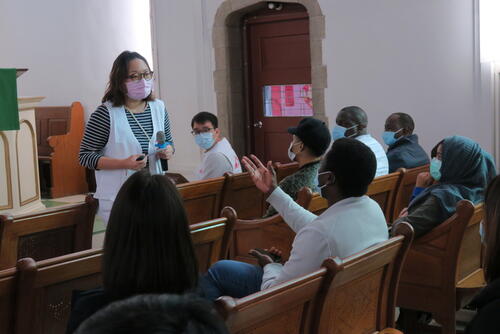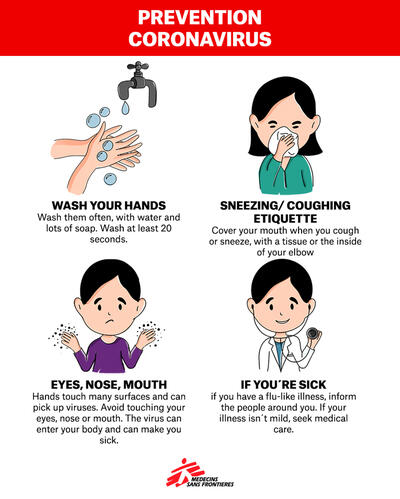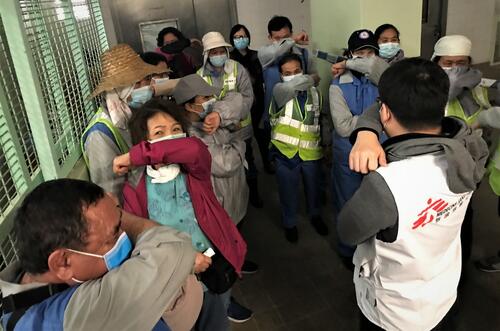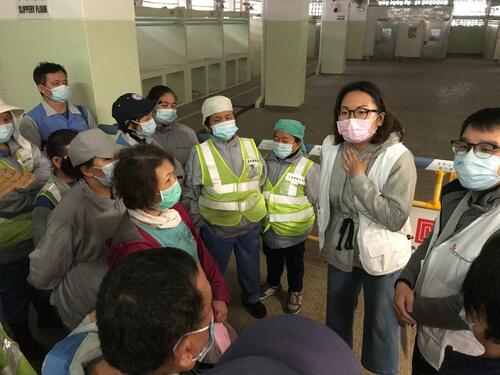MSF’s epidemiologists and infectious disease experts are following the fast-evolving development of the outbreak of the novel coronavirus (COVID-19). As of 14 February, there are more than 64,000 cases worldwide, more than 99 per cent of which are in mainland China.
We have offered support to the health authorities in mainland China and Hong Kong, who are leading the respective response efforts, and offering support similar to what we did in 2003 during the outbreak of Severe Acute Respiratory Syndome (SARS), caused by a related type of coronavirus.
These activities included training of healthcare staff on methods to prevent and control infections, and health education for vulnerable and at-risk groups.
An MSF team is being sent to Hong Kong with an initial focus on health education for vulnerable groups, such as the elderly and other at-risk groups.
Because the COVID-2019 virus is new, much remains to be understood. However, as with other coronaviruses, droplet infection seems to be the main mode of transmission.
Infection control measures such as hand-washing and cough etiquette (cover coughs with disposable tissues or clothing) are therefore very important to help prevent new cases.

Questions and answers - COVID-19 coronavirus
What is the disease?
The disease is called COVID-19 (short for Corona Virus Disease that emerged in 2019). It is caused by a virus which was discovered in early January in China and has been identified as a member of the family of coronaviruses.
The virus seems to be transmitted through droplets spread by coughing that can be breathed in, or infect surfaces that people touch. This virus affects the respiratory system. The main symptoms include general weakness and fever; coughing and sometimes to pneumonia and difficulty of breathing in a later stage.
What is known about the virus?
The virus was identified early January by Chinese scientists and is now called SARS-CoV-2, because of its similarities to the virus that causes SARS. The name of the disease caused by this new virus is COVID-19. The coronaviruses are a large family of viruses, most of which are harmless for humans. Four types are known to cause colds, two other types can cause severe lung infections (SARS and MERS) similar to COVID-19.
Like all viruses, SARS-CoV-2 needs cells of living beings to multiply itself. This virus seems to target cells in the lungs, and possibly other cells in the respiratory system too. Cells infected by the virus will produce more virus particles, which can then spread to other people by coughing, for instance.
How dangerous is the disease COVID-19?
Our understanding of the virus and the disease is still evolving. Many people infected with the virus will not be very sick. It is even possible that some people don’t get sick at all if they’re infected. The latest estimates are that 82% of the people who get infected will only suffer from a mild form of disease; 15% will develop moderate disease, and 3% will be severely ill.
The disease seems more dangerous for elderly people or people suffering from other infections or ailments, as often is the case with infectious diseases. More than 80% of the people who have so far died of COVID-19 were over 60 years old, and over 75% had underlying medical conditions.
The mortality is higher in Wuhan (4.9%), and lower in the rest of China (2.1%). Outside China, it’s even lower (0.2%). It’s not fully understood why the mortality is different in different places. But as the epidemic evolves, these figures can still change.
How contagious is the disease?
Our understanding of the virus and the disease is still evolving. The virus can be spread by the coughing of sick people. It might be possible that the virus can be spread by infected people without symptoms, but if this is the case, it will only be a small minority of the infections. The same goes for the stool of infected people.
As more than 64,000 people have been reported to be infected, this virus has already spread widely, with 99% of cases in China. But how efficiently the virus is transmitted from one person another is not fully understood yet. Therefore, it is very difficult to make epidemiological forecasts.

What is the link to SARS/MERS?
SARS (Severe Acute Respiratory Syndrome) and MERS (Middle Eastern Respiratory Syndrome) are both infections of the respiratory system. They are caused by viruses (SARS-CoV and MERS-CoV respectively) that are also members of the family of coronaviruses, like SARS-CoV-2.
SARS was discovered in 2002 in mainland China and spread to a number of other countries. More than 8,000 people fell sick, and 774 of them died of the disease. Since 2004, no new cases of SARS have been recorded. MSF intervened in mainland China, Hong Kong, and Vietnam for the outbreak of SARS.
MERS was discovered in 2012, when an epidemic started in Saudi Arabia. More than 1,200 people fell sick, and 449 of them died. MERS still infects people every now then, primarily in Middle Eastern countries. MSF has not intervened during outbreaks of MERS.
What can be done to respond to the outbreak?
For now, the health authorities are leading the response efforts including diagnosis of the virus, patient care, contact tracing, and investigations into a better understanding of the disease. Since it is a new virus, there is currently not a vaccine or specific treatment. Clinical trials for several antiviral drugs are ongoing in China. The understanding of the virus and the disease are still evolving.
We do know that in a respiratory disease outbreak, it is important to apply hand hygiene, coughing etiquette, avoid close contact with people showing symptoms of respiratory diseases, and inform the doctor when feeling sick. Public awareness of the virus and enhanced prevention measures such as these are key components for prevention.
What did MSF do during the SARS outbreak? MERS?
During the outbreak of SARS, MSF supported the Bach Mai Hospital in Vietnam with an isolation ward. In mainland China, we gave support with training of healthcare staff in infection prevention and control in the city of Zhangjiakou in Hebei province.
In Hong Kong we provided support with training of healthcare staff in infection prevention and control, healthcare education for people, and donated protection equipment.
MSF did not intervene for MERS outbreaks.
How can I prevent myself from being infected with COVID-19 coronavirus?
As with other coronaviruses, droplet infection seems to be the main mode of transmission. The virus enters the human body through the mouth or nose. This can happen by breathing in infected droplets, or by touching a surfaced in which droplets have landed with your hands, and then touching your mouth or nose later. Hence, simple infection control measures such as hand-washing and cough and sneeze etiquette are effective and important for prevention.
Hand hygiene is paramount, so wash your hands often with soap and water. Use enough soap, and make sure all parts of both your hands are washed. Spend at least 20 seconds washing your hands. If there’s no visible dirt on your hands, an alcohol-based gel is also a good option.
If you cough or sneeze, cover your mouth and nose with a tissue, or with the inside of your elbow. Put used tissues in the bin immediately, just like used masks, and wash your hands.





